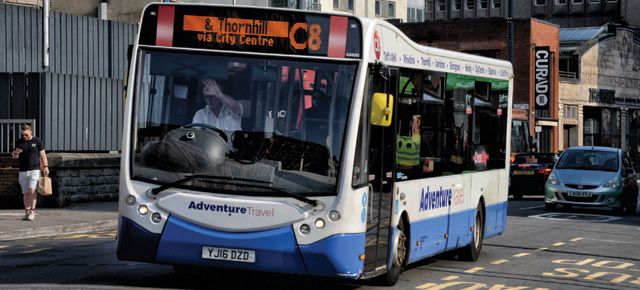Minister wanted to offer a flat fare to counterbalance his radical reshaping of roads policy, but says ‘the Truss budget has blown that out of the water’

Lee Waters, the Welsh Government’s deputy climate change minister, has revealed that he had planned to unveil a flat £1 fare for bus journeys anywhere in Wales as a counterbalance to his radical reshaping of roads policy last week. He said the fiscal legacy of Liz Truss’s short premiership had left his government unable to fund the £1 scheme.
Last week, Waters announced that the government would apply new criteria to future road schemes, with no new roads to be built which would increase capacity or speeds for private cars. This was in line with the recommendations of an independent Roads Review Panel which had scrutinised more than 50 paused schemes, most of which have now been cancelled.
One of the panel’s reasons for rejecting schemes was that the investment would make the private car a more attractive alternative to public transport. This would cause modal shift in the opposite direction to that required for climate change reasons, as set out in the Wales Transport Strategy and Net Zero Wales.
Waters faced a barrage of criticism from politicians – including fellow Labour MSs – for halting road schemes. His critics in the Senedd and the media landed punches because he was unable to provide concrete details of new measures to make public transport more attractive as alternatives to the car in areas where roads had been cancelled. However, the government highlighted that the events of recent months had resulted in its capital budgets for 2024/25 being 8.1% lower in real terms than currently.
Talking to Passenger Transport on the day of the announcement, Waters said: “The Truss budget that blew up has really caused us a number of problems. We had ambitions to introduce a flat £1 bus fare. We had done an awful lot of work with local government and TfW and some bus companies to model how that would work and what it would cost, across Wales.
“We spent over a year on that, behind the scenes. We reached a figure of around £90m and we had a sporting chance of achieving that before the Truss budget, but the Truss budget has blown that out of the water.
I would have been much happier announcing the roads review against the backdrop of saying to people, ‘We can make your life easier by giving you cheaper access to buses’, but the UK economic implosion has prevented that from happening
“I would have been much happier announcing the roads review against the backdrop of saying to people, ‘We can make your life easier by giving you cheaper access to buses’, but the UK economic implosion has prevented that from happening.
“It’s also created significant infrastructure cost pressures, as with everybody, which has hit us from TfW.” The cost of the Core Valley Lines programme, currently being delivered by Transport for Wales and Amey, has increased sharply, from about £750m to at least £1bn.
Waters said the impact on the government’s budget “has created some real difficulties for us now when it comes to dealing with the bus crisis”. The short-term picture was very challenging. “We’re not where we need to be to encourage people to use more public transport because we’re going to be seeing services curtailed, costs going up and a real problem in messaging to people that public transport is something they should be doing over the car.”
During and after the Covid-19 pandemic, bus operators praised the Welsh Government’s relatively long term allocations of emergency funding to support the sector while passenger numbers recovered. A full recovery has still not happened, and operators were alarmed in early February when the government failed to confirm that the Bus Emergency Scheme (BES) would continue after March.
Operators would have needed to register service reductions with the traffic commissioner by February 3 for the changes to come into effect on April 1, following the 56-day notice period. However, the commissioners have temporarily reduced the window to 28 days to allow for uncertainty over the future of emergency funding in Wales and England.
On February 10, the Welsh Government said it would extend the BES for three months to give the industry short term stability while the government and operators worked together on “planning bus networks which better suit the new travel patterns we have seen since the end of the pandemic”.
Even before the uncertainty over BES began, operators were withdrawing services in response to reduced demand since the pandemic, increased costs or staff shortages. On February 11 the TrawsCymru T19 service between Blaenau Ffestiniog and Llandudno ceased. Adventure Travel has now decided to withdraw its C8 cross-city service between Cardiff Bay and Thornhill on April 4.
This story appears in the latest issue of Passenger Transport.
DON’T MISS OUT – GET YOUR COPY! – click here to subscribe!








